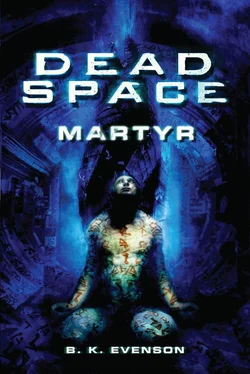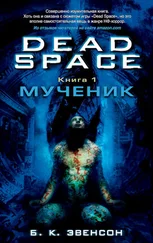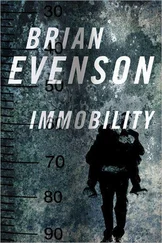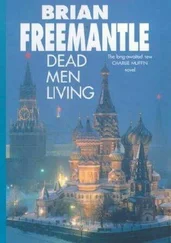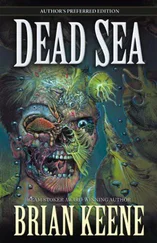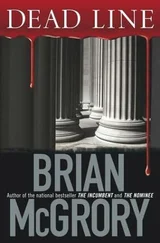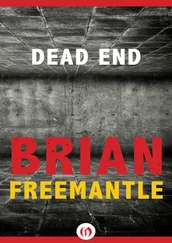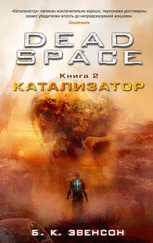Brian Evenson - Dead Space - Martyr
Здесь есть возможность читать онлайн «Brian Evenson - Dead Space - Martyr» весь текст электронной книги совершенно бесплатно (целиком полную версию без сокращений). В некоторых случаях можно слушать аудио, скачать через торрент в формате fb2 и присутствует краткое содержание. Год выпуска: 2010, ISBN: 2010, Издательство: Tom Doherty Associates, Жанр: Ужасы и Мистика, Фантастика и фэнтези, на английском языке. Описание произведения, (предисловие) а так же отзывы посетителей доступны на портале библиотеки ЛибКат.
- Название:Dead Space: Martyr
- Автор:
- Издательство:Tom Doherty Associates
- Жанр:
- Год:2010
- ISBN:9780765325037
- Рейтинг книги:4 / 5. Голосов: 2
-
Избранное:Добавить в избранное
- Отзывы:
-
Ваша оценка:
- 80
- 1
- 2
- 3
- 4
- 5
Dead Space: Martyr: краткое содержание, описание и аннотация
Предлагаем к чтению аннотацию, описание, краткое содержание или предисловие (зависит от того, что написал сам автор книги «Dead Space: Martyr»). Если вы не нашли необходимую информацию о книге — напишите в комментариях, мы постараемся отыскать её.
A universe cursed with life after death.
It all started deep beneath the Yucatan peninsula, where an archaeological discovery took us into a new age, bringing us face-to-face with our origins and destiny.
Michael Altman had a theory no one would hear.
It cursed our world for centuries to come.
This, at last, is his story.
Dead Space: Martyr — читать онлайн бесплатно полную книгу (весь текст) целиком
Ниже представлен текст книги, разбитый по страницам. Система сохранения места последней прочитанной страницы, позволяет с удобством читать онлайн бесплатно книгу «Dead Space: Martyr», без необходимости каждый раз заново искать на чём Вы остановились. Поставьте закладку, и сможете в любой момент перейти на страницу, на которой закончили чтение.
Интервал:
Закладка:
A few minutes later, the Colonel was back on the vidscreen, telling Tanner that Altman had already had a call from the technician — Bacon was his name. Or no, not quite that, another kind of meat: Ham. Hammond.
“Too late to trace it,” the Colonel said, “but let’s bring this Hammond in and have a chat.”
Which brought Tanner back to where he was now, impressed by how impassive and stern the Colonel’s face remained as Tanner told him that Hammond was dead.
“Any chance they’re lying to you?” asked the Colonel.
“I’ve seen the body myself,” said Tanner. “He’s dead, all right. They were just trying to bring him in, just talking to him, and he flipped and slit his own throat.”
“He what?”
“Slit his own throat. Almost sawed his head off.”
“Just talking to him, you say,” said the Colonel. “What’s that supposed to mean? People don’t slit their throats when you’re just talking to them.”
Tanner swallowed. Talking to the Colonel made him nervous.
“Any chance they nudged him along a little too hard?” the Colonel asked.
Tanner shook his head. “I’ve worked with these men before,” he said. “They’re completely reliable. They had their orders straight. Trust me, they were as surprised as you and I.”
The Colonel gave a curt nod. “You think this Altman’s a threat?”
Tanner shrugged. “I was hoping to find that out from Hammond.”
“Best guess,” said the Colonel. “Threat or not?”
Tanner glanced down at the holofiles he’d spread before him, spun them through the holoscreen. Copies of them, he knew, were appearing on the other side of the link, where the Colonel could see them. “I don’t think there’s much to worry about with Altman,” he said. “There’s nothing special about him. Your run-of-the-mill scientist. No Einstein, not really the sort that stands out from the pack.”
“In my experience,” said the Colonel, “nobody stands out from the pack until they’re given a reason to. It’s not until then that you know whether they’ll bend or break.”
“I suppose so,” said Tanner. “In my experience, very few people ever get that far.”
The Colonel nodded, lips tight. “But if Altman does?…”
Tanner thought about it. “I don’t know,” he said. “He doesn’t seem to be the hero type. He’s not likely to be an industrial spy for another corp, I don’t think, and not likely to opt to become one. He seems to have taken his current job exclusively so as to follow his girlfriend down to Chicxulub.”
“Could be a good cover,” said the Colonel.
“Could be,” said Tanner. “But you’d probably know better than me if it was, and, if so, for what. I don’t think it’s a cover.”
The Colonel scanned quickly through the files. “No,” he said, once he’d finished. “I don’t think so either.” He stayed for a moment, staring straight into the screen. To Tanner it felt like the Colonel was staring through him, not even seeing him.
Finally the Colonel said, “Let’s move things forward quickly.” He turned to his own holobank, sent a rendering through his vidscreen to Tanner. A three-dimensional image. Some kind of vessel. At first Tanner thought it was a spacepod and experienced a brief wave of fear: he had been part of the shock troops for the moon skirmishes, part of the deadly fight over which nation had the right to the resources of the moon. He had spent harrowing hours with his oxygen running out, siphoning from the tanks of the dead and dying around him. Last thing he wanted was to be in space again. But then he noticed the screw engines and realized it wasn’t a spacecraft at all: it was some sort of submarine. Deepwater, from the looks of it.
“What is it, sir?” he asked.
“The F/7,” the Colonel said. “Prototype submersible, not released yet, even among our people. I’m sending it to you. Find two men to man it, people you can trust. And quickly. We need to get there first.”
12
He chose Dantec, an ex-military man from his own outfit he’d brought with him ten years back when he’d first signed on, someone whom he trusted implicitly and who, in addition, knew how to pilot just about anything. Dantec was good at thinking on his feet, very quick. He also had no compunctions about doing something questionable as long as Tanner was the one asking. But he’d also been known to be a little too quick to resort to violence if something went wrong. Something had happened to Dantec during the moon skirmishes, something that had left his eyes steady but flat, as if nobody was home inside. Tanner wasn’t sure what it was.
He’s not a bad guy, Tanner told himself the few times Dantec had done something that he found hard to accept, even with his own fairly lax morals. He just doesn’t see things the way I do. And then, as an afterthought, he would often find himself thinking, I’m not a bad guy either.
Tanner sighed. Bad guys or not, both he and Dantec would do what they felt, in their own way, they had to do.
He had to search a little for the other man, pulling him out of DredgerCorp’s North American headquarters. His name was Hennessy and he was a marine geologist, also with quite a bit of submarine experience. He was bald although still fairly young, mid-thirties. He was also well respected, and if he was already with DredgerCorp, that probably meant he wouldn’t object too strongly to something a hair outside the law. But the Colonel’s question about Altman was still nagging at him: If push came to shove and Hennessy realized the full extent of what they were doing, would he bend or break? No way to tell, Tanner thought, but thought he was more likely to go with the flow than to protest or try to stop them.
Tanner made arrangements through President Small, got Hennessy on the next flight south. By the time the man had reached Puerto Chicxulub, the F/7 had arrived, was waiting for them under a tarp on the deck of an unmarked freighter about fifteen miles away from the center of the crater. Though a rusty hulk on the outside, the freighter was retrofitted with state-of-the-art equipment inside. It was crewed by either military or ex-military — they didn’t wear regulation uniforms, but their training was clear from the tight economy of their movements, their meticulous haircuts, and the way they snapped to obey an order.
“Should we be careful what we say around the crew?” Tanner asked the Colonel over the vid linkup.
“You should be careful what you say around anybody,” said the Colonel, and then showed his teeth in a way that Tanner guessed might be a smile. Definitely a carnivore, Tanner thought. Then the Colonel’s lips slid over his teeth again and he said, “Don’t say more than you have to.”
The F/7 was a bathyscaphe. A prototype drilling model, something made to descend to great depths and then bore quickly down through solid rock. Hennessy responded to it like a kid waking up on Christmas morning to find a pony waiting downstairs. He went around the craft with Tanner and Dantec in tow, babbling about the combination of the titanium alloy drill and the molecular pulverizers meant to keep the path clear. Tanner and Dantec just pretended to humor him.
“Don’t tell me we’re going down into Chicxulub,” said Hennessy, excited. “I’ve always wanted to go there. What are we looking for?”
You’ll know soon enough, thought Tanner grimly. “Just a few dives,” he said as casually as possible. “Just something to run the F/7 through its paces. Routine.”
Over the next few days, Tanner had them do just that. They put the F/7 through its paces, first seeing how maneuverable it was gliding along the surface, then testing it in deeper waters. and then finally testing the drill and the pulverizers. It wasn’t the most maneuverable craft Hennessy had ever seen, but that wasn’t the point of a bathyscaphe: it had to be solid and able to withstand tremendous pressure when it dived deep. On the surface it bobbed drunkenly along, slowly tacking in the direction it wanted to go. Underwater it was better, more responsive. And it was best of all once they had it boring through mud and into rock. Even when the drill was on full and biting into hard rock, the craft was stable, hardly shaking at all. Rear thrusters kept it up against the rock, and the drill itself pulled them forward if the threading had anything to grab. Meanwhile the pulverizers turned the remaining rock into a fine gravel and forced it back to where it caught in the thrusters and kicked away or dissolved entirely. Hennessy claimed he’d never seen anything like it.
Читать дальшеИнтервал:
Закладка:
Похожие книги на «Dead Space: Martyr»
Представляем Вашему вниманию похожие книги на «Dead Space: Martyr» списком для выбора. Мы отобрали схожую по названию и смыслу литературу в надежде предоставить читателям больше вариантов отыскать новые, интересные, ещё непрочитанные произведения.
Обсуждение, отзывы о книге «Dead Space: Martyr» и просто собственные мнения читателей. Оставьте ваши комментарии, напишите, что Вы думаете о произведении, его смысле или главных героях. Укажите что конкретно понравилось, а что нет, и почему Вы так считаете.
